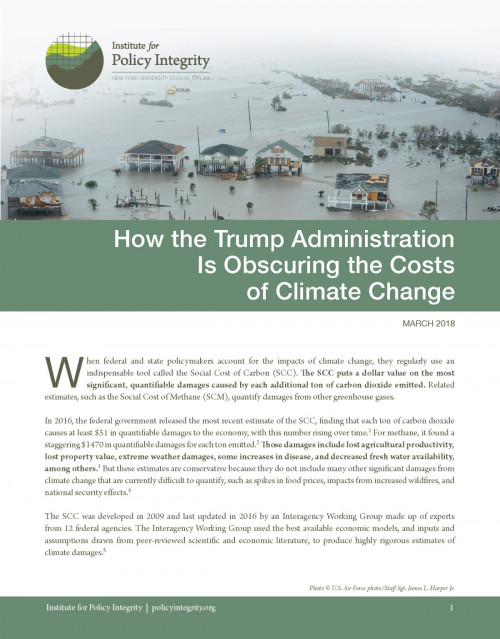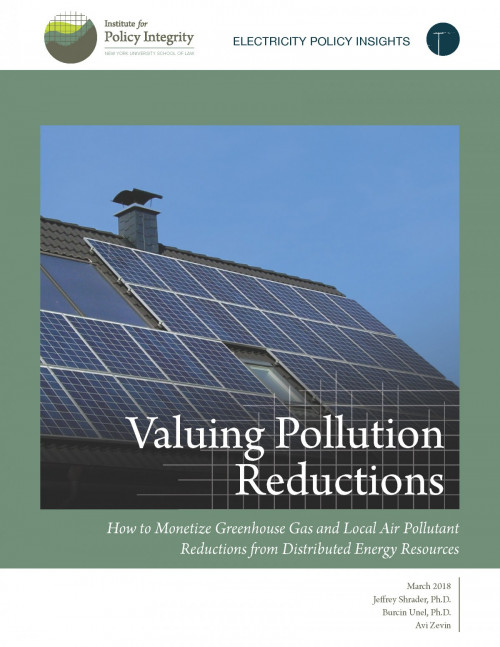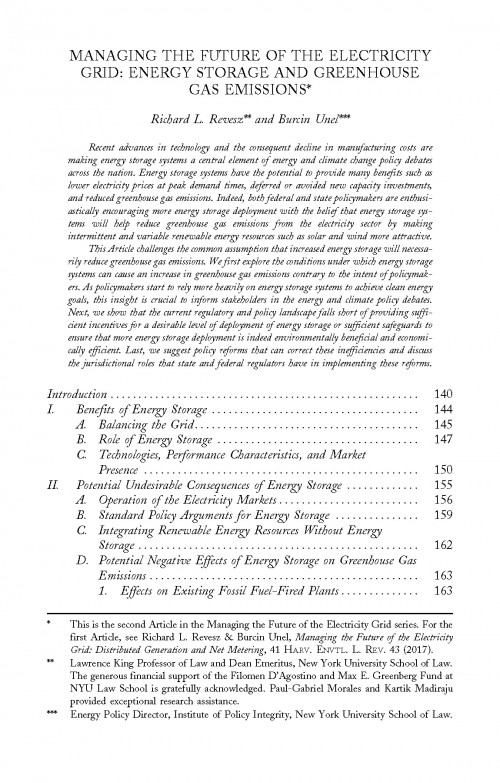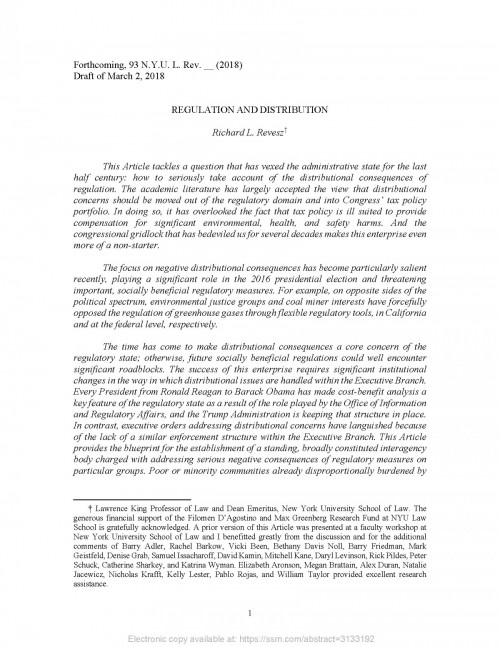-
Brief to Forest Service on Expansion of Colorado’s West Elk Coal Mine
The U.S. Forest Service continues to ignore climate damages in its final approval of a coal mine expansion in Colorado, despite a court ruling that asked the Forest Service to disclose the effects of greenhouse gas emissions from the expansion. In its final environmental impact statement (EIS) on the project, Forest Service quantifies how much the expansion will increase greenhouse gases emissions but only gives a generic description of climate change and its effects. By not quantifying and monetizing the effects of this increase in emissions, the EIS obscures information necessary for the public to appreciate how the expansion will result in hundreds of millions of dollars in climate damages. Our brief to the District Court of Colorado argues that Forest Service’s failure to monetize climate impacts was arbitrary and is still in violation of the National Environmental Policy Act.
-
Comments on Department of Energy’s Energy Conservation Standards Program
The Department of Energy (DOE) requested information on adding market-based compliance flexibilities to its Appliance and Equipment Energy Conservation Standards (ECS) Program. In many cases, market-based flexibilities lowered compliance costs, incentivized innovation, and decreased administrative burdens without sacrificing policy objectives. But in other cases, these policy tools may not improve economic efficiency and may actually undermine policy objectives. Comments from our Legal Director, Jason Schwartz, recommend that DOE should only proceed with market-based flexibilities after balancing gains to efficiency against unintended negative consequences to policy goals, and that better energy labels on appliances may be necessary to help prevent consumer confusion caused by the market system.
-

How the Trump Administration Is Obscuring the Costs of Climate Change
When federal and state policymakers account for the impacts of climate change, they regularly use a tool called the Social Cost of Carbon (SCC). The SCC puts a dollar value on the most significant, quantifiable damages caused by each additional ton of carbon dioxide emitted. The most recent estimate of the cost is at least $51 per ton and rising over time. But now, turning its back on years of work, the Trump administration has disbanded the federal group that developed the SCC, and produced a new “interim” estimate claiming that each ton of carbon dioxide causes as little as $1 in climate damages. This issue brief describes how the Trump Administration reached this misleading number by ignoring the interconnected, global nature of our climate-vulnerable economy and obscuring the devastating effects that climate change will have on younger and future generations. Though the administration has been proposing rollbacks of environmental rules using this problematic SCC estimate as justification, we explain why federal agencies and state governments should continue using the most recent estimate by the Interagency Working Group that developed the SCC.
-

Valuing Pollution Reductions
How to Monetize Greenhouse Gas and Local Air Pollutant Reductions from Distributed Energy Resources
Distributed energy resources (DERs)—grid-connected, small-scale electric generators such as rooftop solar installations, micro-turbines, combined heat and power systems, customer backup generators, and distributed energy storage systems—are a growing part of the U.S. electric system. They can help avoid the high levels of greenhouse gases and local air pollution produced by traditional energy sources. As their use grows, state electric utility regulators are seeking to compensate DERs accurately for the benefits they offer, including reductions in pollution that contributes to climate change and harms human health. This report shows how regulators can calculate the types and amount of pollution avoided, and then monetize these benefits for use in policy.
-

Managing the Future of the Electricity Grid: Energy Storage and Greenhouse Gas Emissions
Recent advances in technology and the consequent decline in manufacturing costs are making energy storage systems a central element of energy and climate change policy debates across the nation. Energy storage systems have the potential to provide many benefits such as lower electricity prices at peak demand times, deferred or avoided new capacity investments, and reduced greenhouse gas emissions. Indeed, both federal and state policymakers are enthusiastically encouraging more energy storage deployment with the belief that energy storage systems will help reduce greenhouse gas emissions from the electricity sector by making intermittent and variable renewable energy resources such as solar and wind more attractive. This article, published in the Harvard Environmental Law Review, challenges this common assumption that increased energy storage will necessarily reduce greenhouse gas emissions.
The article was selected by Environmental Law Reporter as one of the five best environmental law articles published during the 2018-2019 academic year. An adapted version, The Future of Energy Storage: Adopting Policies for a Cleaner Grid, was included in the August 2019 Environmental Law and Policy Annual Review issue of Environmental Law Reporter’s News & Analysis.
-
Comments to California on Its Cap and Trade Program
California has legislation authorizing its Air Resources Board (ARB) to extend its cap-and-trade program for carbon emissions. This extension, while defining much of the program’s structure, asks ARB to develop some design features through a regulatory process and public feedback. California’s most recent changes to the plan are consistent with our previous comments on the program, and they place California on the path to internalizing the cost of climate change from carbon emissions. Our most recent set of comments encourage ARB to continue to set the price ceiling for carbon permits at least as high as the Social Cost of Carbon set by the Interagency Working Group in 2016, as it does in its Concept Paper on carbon pricing. We also encourage ARB to allocate preferentially any unsold carbon allowances to the price ceiling, rather than to a lower price.
-
Comments on California PUC Order Instituting Rulemaking to Create a Consistent Regulatory Framework for the Guidance, Planning, and Evaluation of Integrated DERs
California has long been a trendsetter in clean energy policy, and our input helped inform the state’s approach for evaluating distributed energy resources (DERs), such as rooftop solar installations. The state’s new approach, which will quantify the environmental benefits of DERs, could help influence other policies around the country, boosting the growth of clean energy sources. Our comments to the California Public Utilities Commission were heavily cited in a March 2018 administrative law judge ruling, which, if adopted by the Commission, would require utilities to conduct a societal cost test to determine the cost-effectiveness of DERs.
-
Brief Challenging Suspension of NHTSA Rule on Fuel Economy Penalties
In 2017, the National Highway Traffic Safety Administration (NHTSA) suspended its 2016 Civil Penalties Rule, which adjusted the penalties for automobile manufacturer non-compliance with fuel economy standards for the first time in decades to reflect inflation. In issuing its suspension, NHTSA claimed that it was causing no harm. Our brief in the case challenging this suspension shows that NHTSA’s claim of no harm was inaccurate.
-

Regulation and Distribution
Most regulations seek to improve social welfare, but maximizing overall welfare may not help or protect all groups evenly. Many economists suggest handling unequal regulatory effects through the tax system. But some harms—like the disproportionately high environmental pollution felt by poor and minority communities and loss of the employment base in rural communities due to shifts in the economy—cannot be addressed by monetary compensation alone. A new article by Richard Revesz, published in the NYU Law Review, offers a blueprint for establishing a standing, broadly constituted interagency body charged with addressing serious negative consequences of regulatory measures on particular groups.
-
Royalty Rate Changes for Offshore Drilling
At a meeting in Houston on February 28, the Interior Department’s Royalty Policy Committee recommended lowering the royalty rate that companies pay to the public when they drill for oil and gas in U.S. coastal waters. Such a change would go against the Interior Department’s statutory mandate to earn fair market value for the development of publicly owned natural resources. Our policy director, Jayni Hein, submitted public comments to the Royalty Policy Committee and spoke at the meeting.
Viewing recent projects in Climate and Energy Policy




